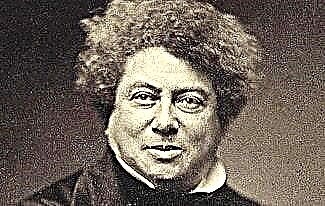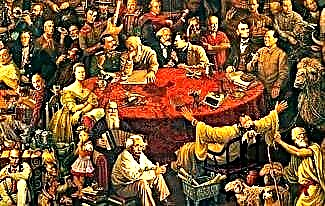Thomas Aquinas (otherwise Thomas Aquinas, Thomas Aquinas; 1225-1274) - Italian philosopher and theologian, canonized by the Catholic Church. Systematizer of orthodox scholasticism, teacher of the Church, founder of Thomism and member of the Dominican order.
Since 1879, he is considered the most authoritative Catholic religious philosopher who managed to connect the Christian doctrine (in particular, the views of St. Augustine) with the philosophy of Aristotle. Formulated the famous 5 proofs of the existence of God.

There are many interesting facts in the biography of Thomas Aquinas, which we will talk about in this article.
So, before you is a short biography of Aquinas.
Biography of Thomas Aquinas
Thomas Aquinas was born in about 1225 in the Italian city of Aquino. He grew up and was brought up in the family of Count Landolphe of Aquinas and his wife Theodora, who came from a wealthy Neapolitan dynasty. In addition to Thomas, his parents had six more children.
The head of the family wanted Thomas to become an abbot in a Benedictine monastery. When the boy was barely 5 years old, his parents sent him to a monastery, where he stayed for about 9 years.
When Aquinas was about 14 years old, he entered the University of Naples. It was here that he began to closely communicate with the Dominicans, as a result of which he decided to join the ranks of the Dominican order. However, when his parents found out about this, they forbade him to do it.
The siblings even put Thomas in a fortress for 2 years so that he would "come to his senses." According to one version, the brothers tried to tempt him by bringing a prostitute to him in order to break the vow of celibacy with her help.
As a result, Aquinas supposedly defended himself from her with a hot log, having managed to maintain moral purity. This incident from the biography of the thinker is depicted in Velazquez's painting The Temptation of St. Thomas Aquinas.
Released, the young man nevertheless took the monastic vows of the Dominican Order, after which he left for the University of Paris. Here he studied with the famous philosopher and theologian Albert the Great.

It is curious that the man was able to keep the vow of celibacy until the end of his days, as a result of which he never had children. Thomas was a very devout man with an interest in scholasticism, a medieval philosophy that is a synthesis of Catholic theology and Aristotle's logic.
In 1248-1250 Aquinas studied at the University of Cologne, where he followed his mentor. Because of his overweight and submissiveness, fellow students teased Thomas with the "Sicilian bull". However, in response to the mockery, Albertus Magnus once said: "You call him a dumb bull, but his ideas will one day roar so loudly that they will deafen the world."
In 1252 the monk returned to the Dominican monastery of St. James in Paris, and four years later he was entrusted with teaching theology at the University of Paris. It was then that he wrote his first works: "On the essence and existence", "On the principles of nature" and "Commentary on the" Maxims "".
In 1259, Pope Urban IV summoned Thomas Aquinas to Rome. For the next ten years he taught theology in Italy, continuing to write new works.
The monk enjoyed great prestige, in connection with which he served for a long time as an adviser on theological issues to the papal curia. In the late 1260s, he returned to Paris. In 1272, after leaving the post of regent of the University of Paris, Thomas settled in Naples, where he preached to ordinary people.
According to one legend, in 1273 Aquinas received a vision - at the end of the morning mass he supposedly heard the voice of Jesus Christ: "You described me well, what reward do you want for your work?" To this the thinker replied: "Nothing but you, Lord."
At this time, Thomas's health left much to be desired. He was so weak that he had to leave teaching and writing.
Philosophy and ideas
Thomas Aquinas never called himself a philosopher, because he believed that this interferes with comprehending the truth. He called philosophy "the handmaid of theology." However, he was greatly influenced by the ideas of Aristotle and the Neoplatonists.
During his life, Aquinas wrote many philosophical and theological works. He was the author of a number of poetic works for worship, commentaries on several biblical books and treatises on alchemy. He penned 2 major works - "Sum of Theology" and "Sum against the Gentiles".

In these works, Foma managed to cover a wide range of topics. Taking as a basis the 4 levels of knowledge of the truth of Aristotle - experience, art, knowledge and wisdom, he developed his own.
Aquinas wrote that wisdom is knowledge about God, being the highest level. At the same time, he identified 3 types of wisdom: grace, theological (faith) and metaphysical (reason). Like Aristotle, he described the soul as a separate substance that after death ascends to God.
However, in order for a person's soul to unite with the Creator, he should lead a righteous life. The individual knows the world through reason, intellect and mind. With the help of the first, a person can reason and draw conclusions, the second allows one to analyze the external images of phenomena, and the third represents the integrity of the spiritual components of a person.
Cognition separates humans from animals and other living beings. To comprehend the divine principle, 3 tools should be used - reason, revelation and intuition. In Sums of Theology, he presented 5 proofs of the existence of God:
- Motion. The movement of all objects in the Universe was once caused by the movement of other objects, and those of others. The first cause of movement is God.
- Generative power. The proof is similar to the previous one and implies that the Creator is the primary cause of everything produced.
- Need. Any object implies potential and real use, while all objects cannot be in potency. A factor is needed to facilitate the transition of things from the potential to the actual state in which the thing is necessary. This factor is God.
- The degree of being. People compare things and phenomena with a perfect something. The Supreme is meant by this perfect.
- Target reason. The activity of living beings must have a meaning, which means that a factor is needed that gives meaning to everything in the world - God.
In addition to religion, Thomas Aquinas paid great attention to politics and law. He called the monarchy the best form of government. An earthly ruler, like the Lord, should take care of the welfare of his subjects, treating everyone equally.

At the same time, the king should not forget that he should obey the clergy, that is, the voice of God. Aquinas was the first to separate - essence and existence. Later, this division will form the basis of Catholicism.
By essence, the thinker meant "pure idea", that is, the meaning of a phenomenon or thing. The fact of the existence of a thing or phenomenon is proof of its existence. For any thing to exist, the approval of the Almighty is needed.
Aquinas' ideas led to the emergence of Thomism, the leading trend in Catholic thought. It helps you gain faith by using your mind.
Death
Thomas Aquinas died on March 7, 1274 in the monastery of Fossanova on the way to the church cathedral in Lyon. On the way to the cathedral, he fell seriously ill. The monks looked after him for several days, but they could not save him.
At the time of his death, he was 49 years old. In the summer of 1323, Pope John XXII canonized Thomas Aquinas.
Photo of Thomas Aquinas


















